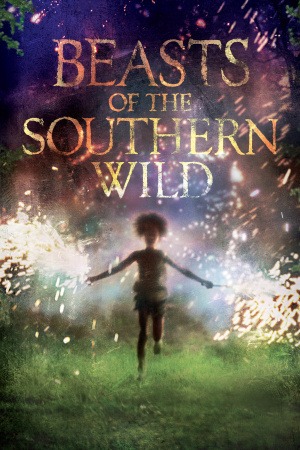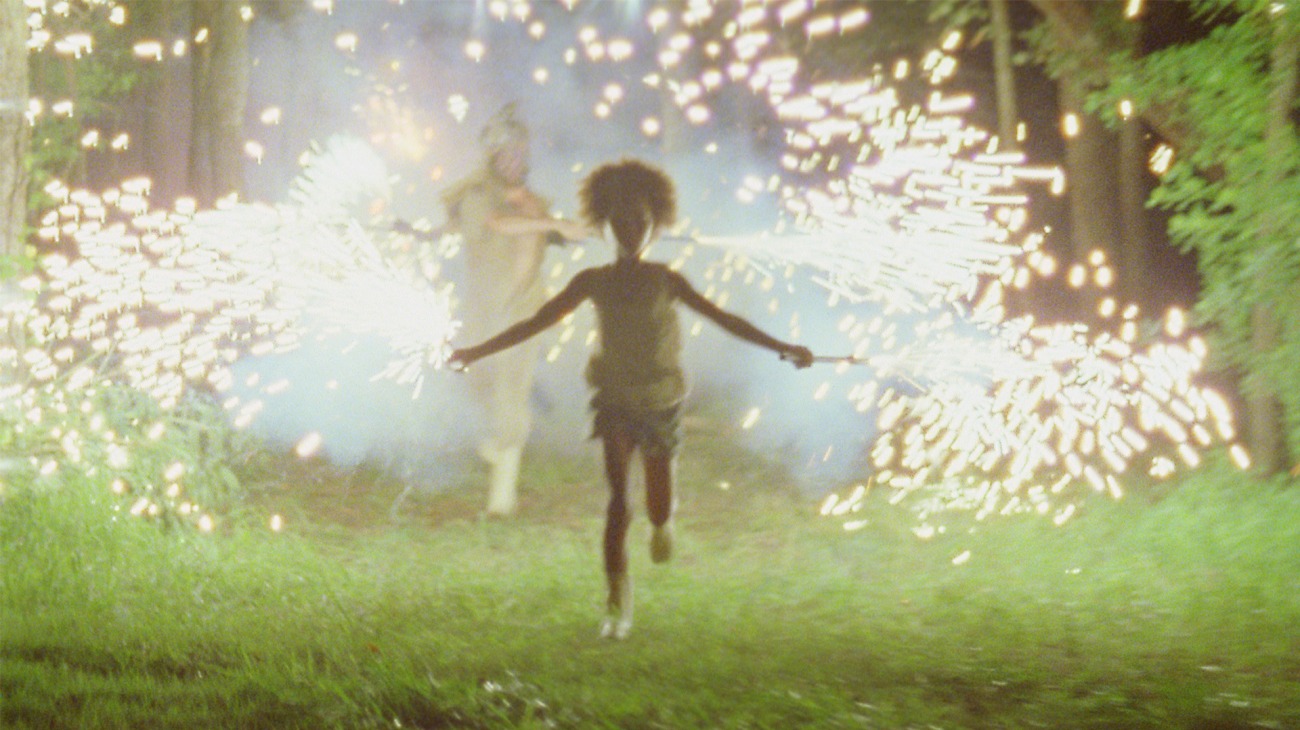
Hush... Hush, Sweet Puppy
Hype is a great leveler: it can ruin a giant studio tentpole or an indie film so tiny it barely exists with equal measure. I start this way, because in the span of just about 18 hours, I saw two movies that, by every fair measure, I "liked"; and for both of them, I had such gigantic expectations that merely "liking" them, feeling entirely good about the experience I'd just had, and feeling like I could guiltlessly recommend them to anybody who asked, was a crushing disappointment. One of these was the powerhouse The Dark Knight Rises, one of the most massive pictures of 2012; the other was the microscopic, hugely-praised Beasts of the Southern Wild. They are as close to perfect polar opposites as two films could be, except that I, personally, feel almost exactly the same way about both of them: totally satisfied and utterly let down.
The film is set in a small Louisiana bayou community separated from what most of us would think of as the niceties of civilization, and depicts the aftermath of a great storm on the people who live there; it was directed by Benh Zeitlin, who co-wrote the script with Lucy Alibar from her play Juicy and Delicious, who between them are in possession of quite a lot of privileged white background (Zeitlin is a Wesleyan graduate; the two met at a New York playwriting camp), and this roused my suspicions pretty good before seeing the movie, but as it turns out this matters almost not at all. There is not a trace of wide-eyed ethnographic Othering involved; wherever Zeitlin and Alibar got their information from as to what the lives of rural dwellers so removed from material trappings that there isn't even a context for calling them "poor" would be like, but Beasts is dripping with authenticity, or with the feeling of authenticity, anyway, which is practically as good.
Our story, which freely melds observational realism, actual history, and fantasy, takes place on an island community calling itself the Bathtub, and here we encounter a six-year-old girl named Hushpuppy (Quvenzhané Wallis). Like most children of that age, her ability to comprehend reality around her is still half-formed at best, and when a storm that probably isn't Hurricane Katrina but certainly doesn't mind reminding us of Hurricane Katrina decimates the Bathtub, she manages to get it inside here head that it has something to do with the release of giant prehistoric pig-like creatures called aurochs, who are coming to overrun her home and destroy everything. Not that it takes prehistoric beasts to threaten Hushppy's delicate life, for even before the storm comes in (the 93-minute film neatly cleaves into thirds: pre-storm, post-storm, outside of the Bathtub), something terrible is happening that she barely notices, in that her father Wink (Dwight Henry), has just been diagnosed with a disease that will remain undisclosed for quite a while; her mother is already gone, and we never do quite find out where to. Meaning that Hushpuppy's life is under siege from all sorts of directions, and the child will have to learn very quickly how to cope on her own, though the hard life of the Bathtub and her father's lovingly harsh instruction on survivalism give her a good leg up in that regard.
I must first say this for Zeitlin, a new director who won the Cannes Camera d'Or for his efforts: Beasts is a shatteringly fleet motion picture, and even now, reflecting on just how much is stuffed into not such a very long running time, I have to count myself hugely impressed by his immaculate control of pacing and timing. When it became clear that we were in the endgame, i actually checked the time, positive that it couldn't possibly be more than 50 minutes or so into the film (it was 70), and I don't know what better praise there can be for how easy it is to watch a movie than that.
Secondly, while his game of casting non-actors to fill basically all of the roles in the film is at least somewhat ineffective (the bulk of the Bathtub's inhabitants drift to the wrong side of the line dividing colorful local color from wacky ciphers), in Wallis and Henry, he found two immeasurably wonderful amateurs, whose ability to sink into their characters and the relationship between them is absolutely the single strongest element in the movie's favor. I am not going to jump on the bandwagon screaming that Wallis gives an amazing, career-starting performance, and she should win all the awards for it - I don't know if it's fair to say that a child of her age can even approach "acting" as a discipline in any meaningful way - but she is managed by her director with great finesse, while also possessing a profound natural screen presence that makes her just plain captivating to watch. Whatever combination of acting, directing, and serendipity went into creating Hushpuppy, the unassailable fact remains that Hushpuppy, in her current state, is a remarkable film creation, and the way the film uses her POV and Malickian narration (for example, when we see the aurochs) while allowing us to be more grown-up and aware than she is would be a real achievement for a much more established filmmaker than Zeitlin. Her growth into greater wisdom and self-reliance is fascinating, sensitively portrayed, and if that's all there was to the movie, it would be every bit the masterpiece that we've been hearing about for all these months.
Unfortunately, there are two out-and-out film-destroying problems - the fact that the movie recovers from either of them demonstrates how much it gets right, and that it recovers from both is all the proof we need that Zeitlin has catapulted to the top ranks of Young Filmmakers to Watch. But there are still two film-destroying problems, and that's just that. The first of these is a crazily awful third act, that swings the action from the now-evacuated Bathtub to a FEMA center, and the writers try to indulge in some political commentary that is, frankly, just embarrassing to behold; the "theme" starts running at a breakneck pace for a Noble Savages motif, that we're automatically supposed to get that the Bathtubbers get it and the bureaucrats don't because of, like, connection to nature and a simpler way of life. Even that would be tolerable, in its way, except that the movie so quickly scoots right back onto another plot, that it ends up not mattering in the slightest that they ever went there, and it becomes wildly obvious that Zeitlin and Alibar have, between them, not actually thought much at all about post-disaster bureaucracy one way or the other, they just figured it would be a good note to strike. Weirdly, it was the sequence out of the whole film that tapped into the "we're children of white privilege" vibe that I was afraid would be omnipresent.
The other problem, and by far the worse, is that Zeitlin and cinematographer Ben Richardson, use handheld cameras almost without exception, and not just handheld cameras, but the particularly jittery, "hey look, it's an earthquake!" shaky handheld cameras that have angered so many people in so many action films and found footage horror movies. It is an atrocious choice, that's not only gross on its own, and undoes all the lovely location photography that might be damn nice if it would stand still for two seconds, it is exactly contrary to what this story needs - for the only value of this kind of shakycam is that it adds a presumptive realism to the onscreen happenings, and Beasts of the Southern Wild is not terribly "realistic"; the effect of Hushpuppy's narration already puts us in a more ethereal, fairytale sort of realm, and the shakycam is a crude violation of that. The film is cheap, and shortcuts must be taken, but this kind of camerawork smacks of outright laziness, and there isn't a single scene where it doesn't distract from the many lovely things the film gets right.
It's a fucking shame: there's so much good happening in the movie, and I want so to love it. The acting, the scene-setting, the sweeping music (by Zeitlin and Dan Romer), the sense of being in a truly new place, a very rare sensation in the movies indeed. But that handheld camera, I swear. It doesn't wreck the movie absolutely, but it single-handedly makes it a vaguely irritating, alienating experience, and if there is an actual masterpiece in here, and not just a promising first start, it has been mangled beyond recognition.
7/10






